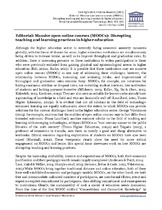Editorial: Massive open online courses (MOOCs): Disrupting teaching and learning practices in higher education
Abstract
Although the higher education sector is currently facing economic austerity measures globally, with the threat of closure for some, higher education institutions are simultaneously being driven to increase intake, as well as to improve throughput and graduation rates. In addition, there is increasing pressure on these institutions to widen participation to those who were previously excluded from gaining physical and epistemological access to higher education (Bali, 2014a; Burke, 2013). It is possible that these institutions may see massive open online courses (MOOCs) as one way of addressing these challenges; however, the relationship between MOOCs, increasing and widening intake, and improvement of throughput and graduation rates remains fuzzy. MOOCs, for example, are notorious for having enormous attrition or dropout rates, not recruiting student interests, low motivation of students and lacking payment incentive (Billsberry, 2013; Koller, Ng, Do & Chen, 2013; Kolowich, 2013; Lindeore, 2013). They are also seen as suitable for learners who already have a grounding of knowledge in a field and who are financially well off (Laurillard, 2014; Times Higher Education, 2013a). It is evident that not all scholars in the field of technology-enhanced learning are equally enthusiastic about the extent to which MOOCs can provide solutions for the current challenges faced in the higher education sector. George Veletsianos (2013), for example, cautions that the realities of open online courses may in fact differ from intended outcomes. Diana Laurillard, another eminent scholar in the field of teaching and learning with emerging technologies, critiques MOOCs as “21st-century answer to the public libraries of the 20th century” (Times Higher Education, 2013a) and Tsigaris (2013), a professor of economics in Canada, sees them as merely a good and cheap alternative to textbooks. Ethical concerns regarding exploitation of students on MOOCs have also been raised (Marshall, 2014). These viewpoints clearly show the need for more critical engagement on MOOCs and hence, this special issue showcases work on how MOOCs are disrupting teaching and learning practices.

